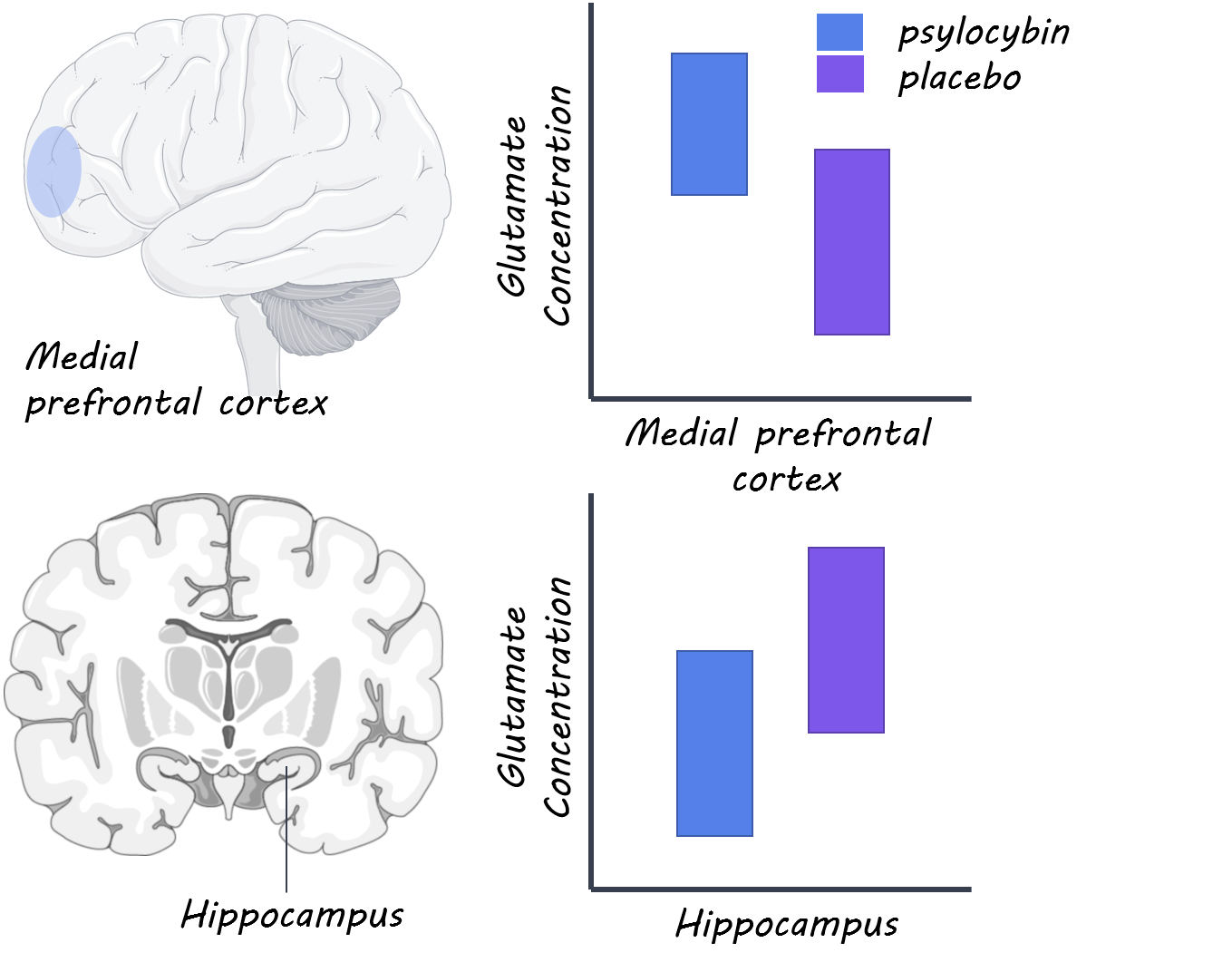Glutamate and Psychedelic-Induced Positive vs. Negative Ego Dissolution Experiences
Post by Flora Moujaes
What's the science?
Psilocybin is a classical psychedelic that can temporarily induce altered states of consciousness, such as ego dissolution. Ego dissolution is characterized by a reduction in awareness of the self and can be both a positive and a negative experience. Recently, researchers have begun to focus on how psilocybin may be used clinically to help with disorders that involve distortions of self-experience, such as depression. But how does psilocybin act on the brain to create these experiences? We know that once psilocybin is ingested, it is quickly metabolized to psilocin, which then acts on serotonin receptors in the brain. There is also accumulating evidence to suggest that this serotonin receptor activation leads to an increase in glutamate (an excitatory neurotransmitter) release, but to date no study has directly investigated how psilocybin administration relates to brain glutamate levels in humans. This week in Neuropsychopharmacology, Mason and colleagues used magnetic resonance spectroscopy (MRS) to investigate for the first time how psilocybin affects glutamate levels in the brain, and how this relates to the experience of ego dissolution.
How did they do it?
To explore how psilocybin influences glutamate levels in the brain and the experience of ego dissolution, the researchers administered a low dose of psilocybin (0.17 mg/kg) to 60 participants in a randomized, double-blind, placebo-controlled study. They then conducted two main analyses: (1) Researchers first assessed the influence of psilocybin on glutamate levels in the brain using magnetic resonance spectroscopy (MRS), which can measure the levels of glutamate in specific brain regions. Based on prior literature on psychedelics, they chose to focus on two regions: the medial prefrontal cortex and the hippocampus. (2) The researchers also investigated the association between glutamate levels and the experience of ego dissolution.
What did they find?
The researchers found that as predicted, psilocybin induced region-dependent alterations in glutamate: following psilocybin administration, glutamate levels in the medial prefrontal cortex increased, while glutamate levels in the hippocampus decreased. They also found that glutamate alterations in certain regions predicted positive and negative experiences of ego dissolution. (1) Higher levels of medial prefrontal cortex glutamate were associated with negatively experienced ego dissolution. This may help explain the paradoxical effect of psilocybin: administered acutely to healthy controls it has been found to increase feelings of anxiety, but in clinical trials, the administration of psilocybin has been shown to result in long-term anxiety relief for patients. (2) Lower levels of hippocampal glutamate were associated with positively experienced ego dissolution. This finding provides support for the theory that ego dissolution is caused by a temporary loss of access to autobiographical memory, as the hippocampus plays a key role in memory.
What's the impact?
This study is the first to directly assess the effect of psilocybin on glutamate levels in humans. The main finding is that psilocybin-induced changes in glutamate are region-dependent, as psilocybin resulted in increased glutamate in the medial prefrontal cortex and decreased glutamate in the hippocampus. These glutamate changes were related to the type of ego dissolution experienced, as changes in medial prefrontal cortex glutamate were the strongest predictor of negatively experienced ego dissolution, while changes in hippocampal glutamate were the strongest predictor of positively experienced ego dissolution. These insights enhance our understanding of the neurobiological mechanisms underlying psychedelic-induced experiences and may inform ongoing clinical trials exploring the therapeutic effects of psychedelics on disorders that involve distortions of self-experience, such as depression.
Mason et al. Me, myself, bye: regional alterations in glutamate and the experience of ego dissolution with psilocybin. Neuropsychopharmacology (2020). Access the original scientific publication here.


